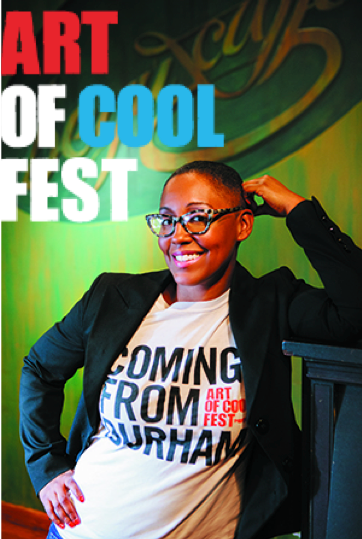Interested in starting your own jazz festival? Or creating hydrogen-rich water to boost your circulation and improve muscle recovery?
These are the accomplishments of Cicely Mitchell and Gail Levy, who were among four inspiring leaders at the evening panel discussion in the Fuqua School of Business this past Wednesday. Excited students and faculty gathered in the Kirby Reading room to learn about the leaders’ unique perspectives as founders of non-profit and for-profit solutions to various social impact and sustainability issues.

Students and faculty gathered for dinner and networking before the panel discussion.
Organized by the Duke Innovation & Entrepreneurship Initiative and the Center for the Advancement of Social Entrepreneurship (CASE), the panel served to enlighten the audience about the challenges the women have faced and the lessons they learned in starting and scaling their social ventures. Panel moderator Erin Worsham, the Executive Director of CASE, opened the discussion with a few statistics.
In the non-profit sector, women make up 75% of the workforce, but in leadership positions, this ratio drops to 45%. As of 2013 in the for-profit sector, only 2.7% of venture capital investments went to fund companies with a female CEO. While black women own 1.5 million businesses in the U.S., they receive only 0.2% of venture funding. Undoubtedly, Worsham concluded, there is a lot of work to do in terms of women getting funded and represented as leaders.

Erin Worsham opened up the panel with statistics about women in the workforce. Worsham is the Executive Director of the award-winning CASE based at Duke University’s Fuqua School of Business
To commence the discussion, Worsham asked the panelists to speak about the gender discrimination they faced while starting their own companies. Gail Levy, founder of H Factor Water, a health-focused company producing hydrogen-infused water in environmentally friendly packaging, answered with a time she was challenged to a drinking match in order to close a deal. “The lesson I learned is to not go and drink your way into making a deal,” Levy joked. “But more importantly, you need to have grit and tenacity. Let our presence be known, because eventually we will be heard.”

Gail Levy was the founder of the White House Millennium Green Committee under the Clinton Administration in 1999. She is passionate about advocating for women worldwide and is also the founder of H Factor Water.
Founder of The Art of Cool, a Durham nonprofit promoting music education to Durham-area youth, Cecily Mitchell remarked that she would be charged significantly more money than a male counterpart to work with the same artist.

Cicely Mitchell is co-founder of The Art of Cool, a Durham nonprofit promoting music education to Durham-area youth
Rebecca Ballard, lawyer and founder of Maven Women, a sustainability-focused fashion company dedicated to making professional wear for women, noted that “we live in a visual world, but we need to start looking at a person’s character rather than solely focusing on how they look.” Based on her experience with her medical real estate development company ACCESS Medical Development, angel investor Stephanie Wilson expanded on the comment, adding that the best thing to do about the prejudice against women is to know that it’s there and fight for it.

Rebecca Ballard told the audience, “The most challenging thing about being a working woman is that appearance is considered ‘relevant.’” She started her career as a public interest lawyer and was previously the Executive Director of Social Impact 360.
I asked the founders to share their experiences in building a successful customer base. Wilson noted that to institute her company, she “determined who was the top real estate agent in our area and sought them out. I discussed my idea with them and asked for their advice on segueing into the market.” She suggested sending handwritten thank you notes to build relationships with your customers.

Stephanie Wilson founded ACCESS Medical Development and is also the co-founder of MillennialsMovingMillions.org.
Mitchell added that The Art of Cool held the first few concerts for relatives and friends, and later partnered up with other small entrepreneurs. “Make sure what you do connects with people enough that they want to go and tell other people about what you’re doing,” she advised.

Cecily Mitchell talked about her experience with The Art of Cool. She handles the booking, contracts, networking, pitching for sponsorships and assisting in writing grants for the company.
Maven Woman founder Rebecca Ballard commented on the importance getting support from women in other sustainable industries, since “you are all driven by the same mission in the social entrepreneurship space.”

Rebecca Ballard is the founder of Maven Women, a sustainability-focused fashion company dedicated on making professional wear for women.
Worsham’s final question for the panel asked for any last pieces of advice. Ballard concluded the conversation with a reason why she started her company: “Social entrepreneurship exists because the status quo is not okay. There are externalities happening and people being treated badly; the status quo doesn’t have to be the way it is.”

Posing with the panelists! From left to right: Anika Radiya-Dixit (author), Gail Levy, Cecily Mitchell, Rebecca Ballard, and Stephanie Wilson.
By Anika Radiya-Dixit

